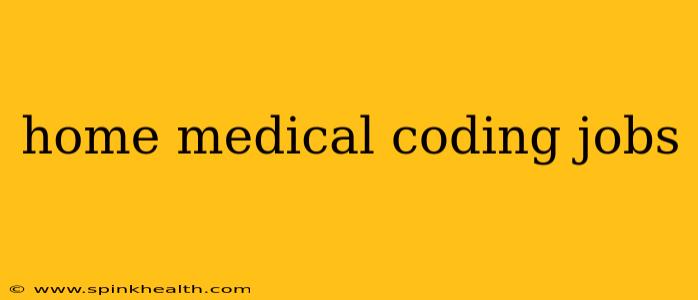The hum of the computer, the gentle click of the keyboard – for many, this is the soundtrack of a fulfilling work-from-home career. And for those with a knack for detail and a passion for healthcare, a home medical coding job might just be the perfect melody. But navigating the world of remote medical coding requires understanding the nuances of the field, the skills needed, and the path to securing that coveted work-from-home position. This comprehensive guide will take you on that journey, answering all your burning questions.
What is Medical Coding?
Before we dive into the specifics of remote work, let's define the core function: medical coding. Imagine being the translator between a doctor's notes and the complex language of healthcare billing. That's precisely what a medical coder does. They translate medical diagnoses, procedures, and services into numerical and alphanumeric codes using standardized systems like ICD-10-CM and CPT. These codes are crucial for accurate billing, insurance claims processing, and overall healthcare data management. It's a meticulous job requiring accuracy, attention to detail, and a deep understanding of medical terminology and anatomy.
What Skills Are Needed for Home Medical Coding Jobs?
The world of medical coding isn't just about numbers; it's about understanding the human story behind them. Here are the key skills you'll need to thrive in this field, whether working remotely or in an office:
- Medical Terminology and Anatomy: A strong grasp of medical terms, anatomical structures, and disease processes is non-negotiable.
- ICD-10-CM and CPT Coding: Proficiency in these coding systems is the bedrock of medical coding. You'll need to understand their intricacies and apply them accurately.
- Knowledge of Medical Insurance and Reimbursement: Understanding how insurance claims work and how they are processed is vital.
- Attention to Detail: Accuracy is paramount. Even a small error can have significant consequences.
- Strong Computer Skills: You'll spend most of your day on the computer, so proficiency is essential.
- Analytical and Problem-Solving Abilities: You'll encounter complex cases requiring critical thinking and problem-solving skills.
How Can I Find Home Medical Coding Jobs?
Finding a home medical coding job requires a strategic approach. Here's a breakdown of effective strategies:
- Online Job Boards: Websites like Indeed, Monster, and LinkedIn are excellent starting points. Filter your searches for "remote medical coder," "work from home medical coding," or similar terms.
- Company Websites: Many healthcare companies, insurance providers, and medical billing services offer remote coding positions. Check their career pages directly.
- Freelance Platforms: Platforms like Upwork and Fiverr can connect you with clients needing freelance medical coding services.
- Networking: Attend online industry events, join relevant groups on LinkedIn, and connect with professionals in the field.
What are the Advantages of Working From Home as a Medical Coder?
The allure of a work-from-home medical coding job is undeniable. Here are the key benefits:
- Flexibility: Set your own hours (within reasonable limits, of course) and create a schedule that suits your lifestyle.
- Comfort and Convenience: Work in the comfort of your own home, eliminating the commute and office distractions.
- Work-Life Balance: Better manage your personal life alongside your professional responsibilities.
How Much Can I Earn Working From Home as a Medical Coder?
Salaries for medical coders vary based on experience, location, and employer. Entry-level positions may offer lower salaries, while experienced coders can command higher rates. Researching salary ranges in your area can give you a clearer picture. Freelancers, too, have the flexibility to set their rates.
What Certifications are Helpful for Home Medical Coding Jobs?
While not always mandatory, relevant certifications demonstrate your competence and can enhance your job prospects. The American Academy of Professional Coders (AAPC) and the American Health Information Management Association (AHIMA) offer respected certifications.
Are there any Disadvantages to Working From Home as a Medical Coder?
Working from home isn't without its challenges:
- Isolation: Lack of face-to-face interaction can lead to feelings of isolation for some.
- Self-Discipline: Maintaining productivity and focus requires high self-discipline.
- Technology Dependence: Reliable internet access and equipment are crucial for smooth operation.
This comprehensive guide provides a solid foundation for your journey into the world of home medical coding jobs. Remember, thorough research, targeted job applications, and continuous skill development are crucial for success in this rewarding field. The quiet hum of your computer can be the soundtrack to a fulfilling and successful career.

